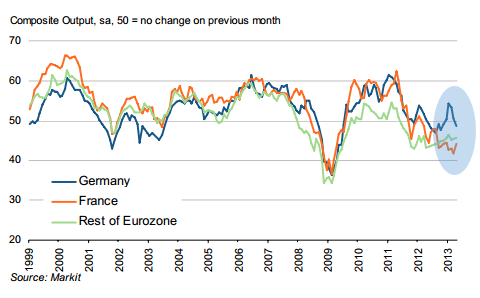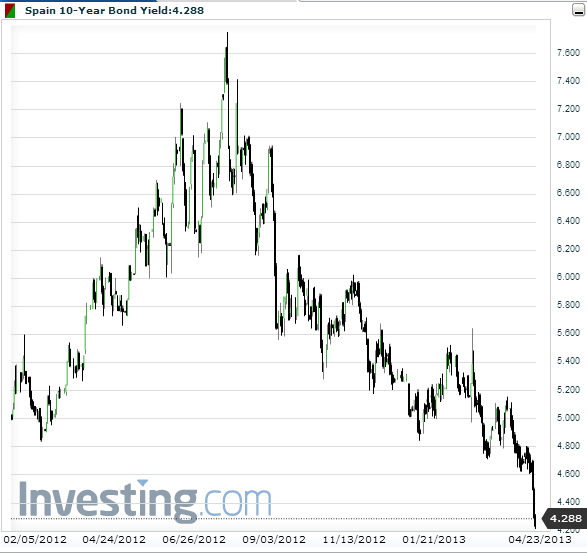As France and Germany PMI measures converge on the rest of the eurozone, and with the area as a whole in a contraction mode, it is becoming increasingly clear that the ECB is likely to ease monetary policy further.

Markit: Activity fell sharply again in both manufacturing and services. While the former saw the steepest rate of decline for four months, the latter saw the downturn ease slightly compared with March.
New business fell for the twenty-first successive month, with the rate of deterioration accelerating for the third month in a row to signal the steepest decline since December. Marked falls were seen in both manufacturing and services.
Some have been hoping that the ECB will follow the Fed, the BOJ and BOE into the brave new world of QE on an unprecedented scale. The probability of such action is quite low however, as the ECB does not have the dual mandate of the Fed and (for now) is only focused on price stability. The ECB also may hold back on buying periphery debt until/unless the nations request "assistance".
Even if the central bank commences some bond buying, it is unlikely to be large and would probably end up being sterilized. Nevertheless, in preparation for this easing action by the ECB, yield hungry investors bought sovereign bonds across the board. Italian and Spanish yields dropped to the lowest level since 2010.

In an economy that may be close to becoming deflationary, the drive for yield seems to override sovereign risks. This move in yields is especially remarkable given that less than a year ago the Spanish banking system was teetering on collapse.

Markit: Activity fell sharply again in both manufacturing and services. While the former saw the steepest rate of decline for four months, the latter saw the downturn ease slightly compared with March.
New business fell for the twenty-first successive month, with the rate of deterioration accelerating for the third month in a row to signal the steepest decline since December. Marked falls were seen in both manufacturing and services.
Some have been hoping that the ECB will follow the Fed, the BOJ and BOE into the brave new world of QE on an unprecedented scale. The probability of such action is quite low however, as the ECB does not have the dual mandate of the Fed and (for now) is only focused on price stability. The ECB also may hold back on buying periphery debt until/unless the nations request "assistance".
Even if the central bank commences some bond buying, it is unlikely to be large and would probably end up being sterilized. Nevertheless, in preparation for this easing action by the ECB, yield hungry investors bought sovereign bonds across the board. Italian and Spanish yields dropped to the lowest level since 2010.

In an economy that may be close to becoming deflationary, the drive for yield seems to override sovereign risks. This move in yields is especially remarkable given that less than a year ago the Spanish banking system was teetering on collapse.
3rd party Ad. Not an offer or recommendation by Investing.com. See disclosure here or remove ads.
Which stock should you buy in your very next trade?
With valuations skyrocketing in 2024, many investors are uneasy putting more money into stocks. Unsure where to invest next? Get access to our proven portfolios and discover high-potential opportunities.
In 2024 alone, ProPicks AI identified 2 stocks that surged over 150%, 4 additional stocks that leaped over 30%, and 3 more that climbed over 25%. That's an impressive track record.
With portfolios tailored for Dow stocks, S&P stocks, Tech stocks, and Mid Cap stocks, you can explore various wealth-building strategies.
